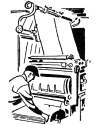 But there is more to the industry than just the paper you buy. To make
accurate and timely news available to everyone, many men have had to
explore and pioneer hundreds of new things. For instance, the news must
first be gathered. Highly trained men must rewrite the news and editors
must make the final check. Next it goes to the composers and makeup men
and finally to the operators of the intricate presses. The matter of
paper and ink alone has been the object of years of research. Lastly,
there is the distribution by every known means of transportation. The
newspaper is truly a cross section of practically all American industry.
But there is more to the industry than just the paper you buy. To make
accurate and timely news available to everyone, many men have had to
explore and pioneer hundreds of new things. For instance, the news must
first be gathered. Highly trained men must rewrite the news and editors
must make the final check. Next it goes to the composers and makeup men
and finally to the operators of the intricate presses. The matter of
paper and ink alone has been the object of years of research. Lastly,
there is the distribution by every known means of transportation. The
newspaper is truly a cross section of practically all American industry.Because a newspaper has to bring out several editions a day, speed is one of the prime elements in the business. One of the common machines used by these newspapers to meet the deadline is the Mergenthaler Linotype. Mergenthaler came to this country at the age of 18, and through his skill in repairing clocks and watches he became connected with August Hahl who made models in Washington, for in those days models were required with patent applications. However, following the panic of 1873, Hahl and young Mergenthaler moved to Baltimore where they came in contact with printing devices. |








